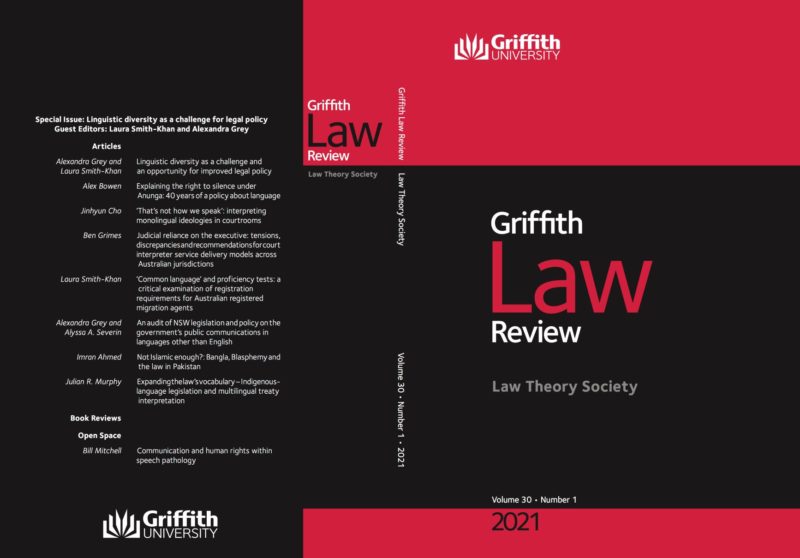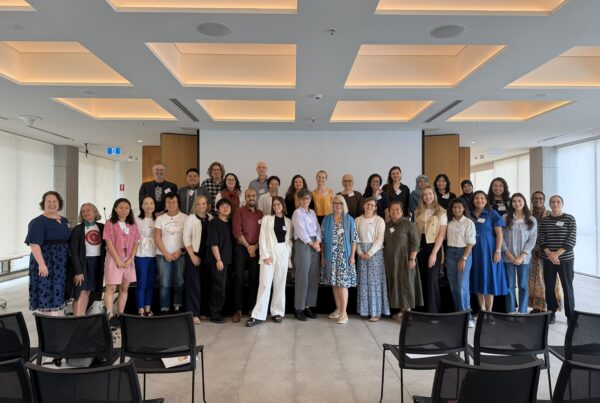The Griffith Law Review has just published a thematic issue on ‘Linguistic diversity as a challenge to legal policy’, which Laura Smith-Khan and I initiated and guest edited over the last two years.
Legal rules and policies about languages can have diverse, serious effects in the judicial system and beyond it, in administrative processes, in law-making (legislative) processes and in seeking to control the way people communicate in various aspects of public life, as we’ve discussed before on the Language on the Move “Language and Law” section.
Interdisciplinary law and linguistics research has emerged in response to a growing curiosity to better understand the potential inequalities and injustices, as we’ve discussed here before.
Yet until this thematic issue, the Griffith Law Review had never devoted an entire issue to language-based problems in laws and legal processes, and nor had it been a focus of legal scholarship more generally. We are hoping that our thematic issue opens readers’ eyes to language – particularly linguistic diversity – as a core concern of legal systems and legal scholarship that has been hiding in plain sight, and constructively links the resolution of concerns to legal policy reforms.
We include within ‘legal policy’ policies of differing form and formality, from court rules to ministerial guidelines to statutory regimes.
Our 11 contributing authors are almost all early career researchers from around Australia. They have diverse academic and professional backgrounds, spanning social sciences, humanities and law as well as professional experience teaching, practicing law and translating law, but they raise shared concerns.
The unifying concern to create better, more just legal policy is relevant to domestic and international audiences because linguistic diversity is part of the context in which most (if not all) legal systems operate. This diverse reality comes into conflict with monolingual processes in state institutions, entrenched beliefs about the value of monolingualism, and legal reifications of the essential linguistic identity of peoples and nations.
Our thematic issue includes the following research on linguistic diversity as a challenge to legal policy in legislative, administrative and judicial processes, with case studies mainly from Australia but also from overseas:
Griffith Law Review: Thematic Issue, ‘Linguistic diversity as a challenge to legal policy’ 2021, volume 30, issue 1.
 Editorial
Editorial
- Alexandra Grey & Laura Smith-Khan ‘Linguistic diversity as a challenge and an opportunity for improved legal policy’ (Fifty free copies here; please only use this link if you do not have institutional access).
Our editorial proposes that more should be done to incorporate linguistic research within legal education. As future legal practitioners and law-makers, law students are an essential audience for this scholarship. Many of the policy suggestions across the research articles would be supported by corresponding reforms to legal education. We suggest that a workable first step could be for legal academics and linguistics academics to work together to develop, teach and share a unit. This is a timely discussion, given that the 11 compulsory subjects across Australian law schools (the ‘Priestly 11’) are currently under review.
In support of this proposition, our editorial reports on a sample inquiry we made into current offerings for university students in New South Wales (NSW) and the Australian Capital Territory (ACT). Overall, this small study found that while a range of subjects appear to touch upon one or more intersections of linguistic and legal scholarship, there are few that offer this intersection as a focus. Across 11 public universities in NSW, we identified only three university courses on language and law offered within law degrees, at the University of Technology Sydney, University of New England and Southern Cross University, while in the ACT, the Australian National University (ANU) offers a forensic linguistics minor in the School of Literature, Languages and Linguistics. We also found (just a few) other university subjects touching on aspects of language and law while having other primary focuses. For example, the ANU offers ‘Literature, Law and Human Rights’ as a law degree elective. And we know from our teaching experience that most law schools offer a foundational subject in which characteristics of legal writing may be covered.
Courts and the justice system
- Alex Bowen ‘Explaining the right to silence under Anunga: 40 years of a policy about language’ (Fifty free copies here; please only use this link if you do not have institutional access).
- Jinhyun Cho ‘“That’s not how we speak”: interpreting monolingual ideologies in courtrooms’.
- Ben Grimes ‘Judicial reliance on the executive: tensions, discrepancies and recommendations for court interpreter service delivery models across Australian jurisdictions’ .
Administrative rules and processes
- Laura Smith-Khan ‘“Common language” and proficiency tests: a critical examination of registration requirements for Australian registered migration agents’ (Fifty free copies here; please only use this link if you do not have institutional access).
- Alexandra Grey & Alyssa A. Severin ‘An audit of NSW legislation and policy on the government’s public communications in languages other than English’ (Fifty free copies here; please only use this link if you do not have institutional access).
Law-making in legislatures
- Imran Ahmed ‘Not Islamic enough?: Bangla, Blasphemy and the law in Pakistan’ . (Fifty free copies here; please only use this link if you do not have institutional access).
- Julian R Murphy ‘Expanding the law’s vocabulary – Indigenous-language legislation and multilingual treaty interpretation’ .
Book reviews
- Ana Sofia Bruzon ‘Shallow equality and symbolic jurisprudence in multilingual legal orders’ (reviewing Janny H C Leung’s 2019 OUP book; fifty free copies here; please only use this link if you do not have institutional access).
- Gareth Lloyd ‘Researching forensic linguistics: approaches and applications’ (reviewing Georgina Heydon’s 2019 Routledge book).
Open Space
- Bill Mitchell (2021) ‘Communication and human rights within speech pathology’ [public lecture] (Fifty free copies here; please only use this link if you do not have institutional access).
The Griffith Law Review is unusual in having an ‘Open Space’ section for non-traditional pieces. We’ve filled it with Bill Mitchell OAM’s 2020 speech on the just-commenced Human Rights Act 2019 (Qld), ‘Speech Pathologists as Human Rights Defenders’. Bill explains that ‘communication rights’ are ‘cross-cutting enablers of other rights’, including legislatively-enshrined rights to freedom of expression, recognition of equality before the law, cultural rights, freedom from cruel and inhuman or degrading treatment in institutional settings, and rights to education and health services. This emphasis on language practices and language rights as gateways to full and fair legal participation and protection echoes the thematic issue’s research articles.
We are proud to have assembled these contributions revealing current, specific issues of linguistic (in)justice as well as thoughtful and practical paths forward; we hope you enjoy reading about them!







 This work is licensed under a
This work is licensed under a
Join the discussion One Comment